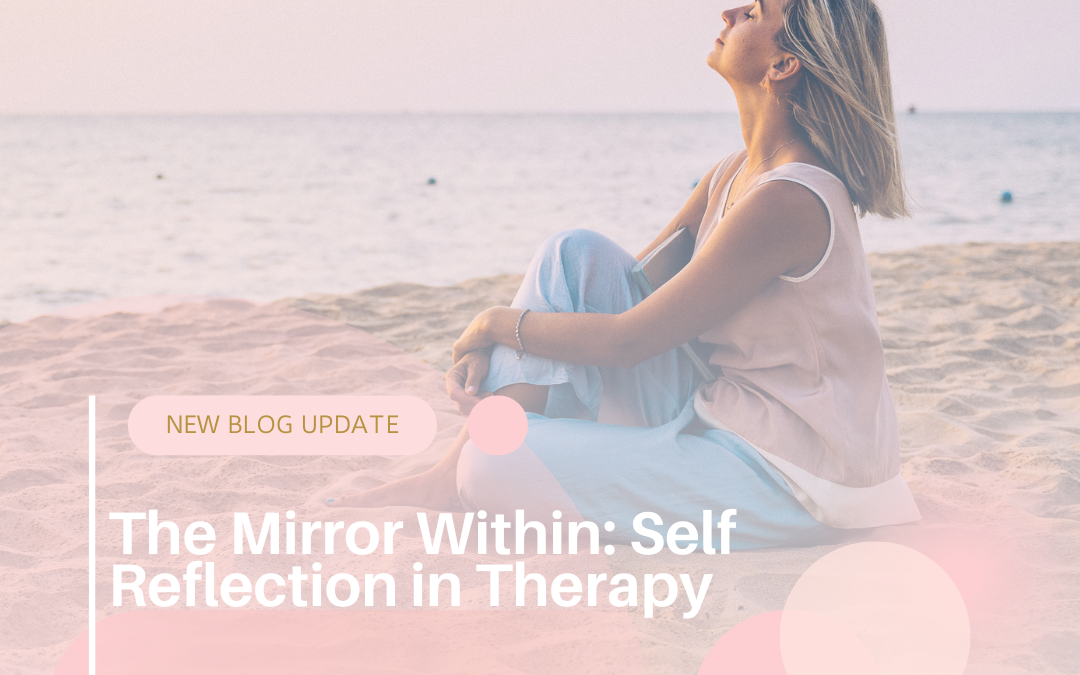When we think about therapy, we often picture talking to someone else—a therapist, a guide, a witness to our stories. But the most powerful conversations in therapy often happen within ourselves. This is the practice of self-reflection—and it’s a key ingredient in meaningful, lasting growth.
Whether you’re just starting therapy or deep into the journey, learning to self-reflect is like turning on a light in a dim room. It helps you see your thoughts, feelings, and patterns more clearly—and make choices that align with who you truly want to be.
What Is Self-Reflection?
Self-reflection is the practice of slowing down and taking a mindful look at your internal world. It’s about becoming more aware of your emotions, reactions, beliefs, and behaviors—without judgment.
It’s not overthinking or ruminating. It’s observing yourself with curiosity and compassion, like a kind scientist studying your own human experience.
Why Is Self-Reflection Important in Therapy?
Therapy isn’t just about what you’re going through—it’s about how you relate to yourself while you’re going through it. That’s where self-reflection becomes transformational. Here’s why it matters:
1. It Deepens Your Awareness
Self-reflection helps you notice what’s happening under the surface. You start to connect the dots between your emotions, your thoughts, and your behaviors. And with that awareness comes choice.
Example: You might realize that when you feel criticized, you tend to withdraw—not because you don’t care, but because you fear rejection.
2. It Supports Emotional Regulation
When you pause to reflect instead of react, you create space to respond thoughtfully. This can reduce impulsive decisions, prevent conflict, and help you manage big emotions with more grace.
3. It Keeps You Engaged Between Sessions
The work of therapy doesn’t stop at the door. Self-reflection helps you carry insights into everyday life. It’s how you apply what you learn in session to the real world.
4. It Builds Self-Compassion
The more you reflect, the more you understand. And the more you understand, the easier it becomes to treat yourself with empathy instead of judgment.
How to Practice Self-Reflection: Simple Tools to Start
1. Ask Yourself Gentle, Open-Ended Questions
Start with questions that invite exploration, not self-criticism. For example:
-
What emotion am I feeling right now?
-
What did that situation remind me of?
-
Why did that comment bother me so much?
-
What story am I telling myself about this?
2. Use a Journal (Even for 5 Minutes)
Writing your thoughts down helps you slow them down. It can uncover feelings you didn’t realize were there and help you organize your internal world.
Tip: Try a simple journal prompt like “Today, I noticed…” or “Lately, I’ve been feeling…”
3. Pause and Reflect After Emotional Moments
When something triggers you—good or bad—pause afterward and ask:
-
What just happened internally?
-
What was I feeling and thinking in that moment?
-
What do I need right now?
4. Practice Mindfulness
Self-reflection doesn’t always need words. Simply noticing your breath, your body, or your thoughts without reacting to them is a powerful reflective practice.
When Self-Reflection Feels Too Hard
There are times when looking inward can feel overwhelming. If self-reflection brings up shame, fear, or confusion, that’s okay. You don’t have to do it alone. Therapy offers a safe, supportive space to unpack what you’re discovering and to build self-awareness at your own pace.
Final Thoughts: Reflection Is the Bridge to Transformation
Self-reflection is like holding up a mirror—not to criticize what you see, but to understand it. When you start to notice your patterns, beliefs, and emotional reactions, you gain the power to make conscious, aligned choices.
In therapy, self-reflection helps you take what you explore in session and live it out in your everyday life. It turns insight into action. And most importantly, it nurtures a stronger, kinder relationship with yourself.
Ready to start your journey inward?
At Central Valley Family Therapy, we’re here to walk beside you as you explore, reflect, and grow—one step at a time.


Recent Comments